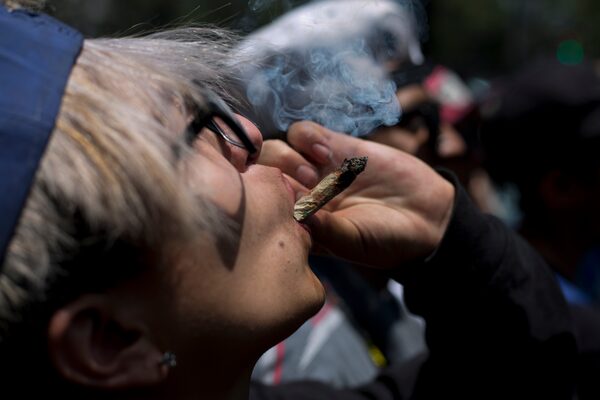Part of cannabis laws and regulations

In this April 20, 2018 file photo, a young man smokes marijuana to celebrate the International Day for Cannabis in Mexico City. Mexico’s Supreme Court issued two more rulings on Oct. 31, ordering that complainants in individual cases be allowed to use marijuana for recreational purposes, establishing a precedent which will apply for others that a blanket prohibition is unconstitutional.Eduardo Verdugo/The Associated Press
Mexico’s next interior minister will introduce legislation to Congress as early as Thursday to regulate the production and use of cannabis, a landmark policy shift in a country shattered by drug-related violence. Mexico will be the most populous country to end prohibition of cannabis, a move already made by Canada and Uruguay.
Olga Sanchez Cordero, a senator who has been named as the future interior minister by president-elect Andres Manuel Lopez Obrador, has drafted legislation – with input from a range of human-rights, justice-reform and public-security organizations – that will permit the cultivation and use of marijuana for medical and recreational purposes, and the development of a medical and industrial cannabis industry that will have Canada as a major export target.
The incoming government is under pressure to move fast on cannabis because, on Oct. 31, Mexico’s Supreme Court issued a pair of rulings that declared a total prohibition of recreational marijuana consumption unconstitutional. Combined with three earlier decisions, this created a binding national precedent and made cannabis possession for recreational use de facto legal.
“The policy of prohibition arises from the false assumption that the problem of drugs should be tackled from a penal focus,” Ms. Sanchez, a former Supreme Court magistrate, writes in the draft legislation. She blamed the militarized war-on-drugs approach of the past 12 years for 235,000 deaths.
In addition to Ms. Sanchez’s bill, a number of other proposed pieces of legislation have been introduced in the lower and upper houses in recent days; all will likely be synthesized into one piece of legislation that will ultimately strongly resemble the one tabled by Mr. Lopez Obrador’s National Regeneration Movement (MORENA). He takes office on Dec. 1 leading a majority in both houses, and so will be able to pass the legislation. It will likely be at least a year before any new law takes effect.
“We’re very enthusiastic to see things moving so fast in Mexico because we’ve been engaged in this discussion since forever and … nothing ever moved as fast,” said Lisa Sanchez, who heads a national public-security and human-rights organization called Mexico United Against Crime. “We’re very positive about the bills – they take into account most of the public worries. They take a public-health-centred approach.”
The MORENA legislation draws heavily on Canada’s: Olga Sanchez was one of seven cabinet ministers in the incoming government who travelled to Canada in October to meet with their Canadian counterparts; diplomatic sources from both countries told The Globe and Mail that Canada’s cannabis regulation experience was her major preoccupation on that trip.
The law that Ms. Sanchez is expected to introduce as soon as Thursday would create a licensing system allowing companies to grow, package, process, transport or sell cannabis, and individuals to cultivate plants for private use through clubs of between two and 150 members, as long as they register in an anonymous government listing and produce no more than 480 grams of marijuana a year. Smoking cannabis would be permitted in any public place where tobacco smoking is allowed. As in the Canadian and Uruguayan legislation, no advertising of recreational cannabis products, nor sale to minors, would be permitted.
The new legislation marks a major departure in how the Mexican state is engaging with drug use, but is unlikely to have an immediate impact on the level of daily violence, which is the product of territorial fighting between drug cartels and militarized law enforcement. Cannabis is now a minimal revenue stream for most cartels, since its price has fallen precipitously in Mexico in recent years after individual U.S. states legalized, shrinking a market that contracted further with Canada’s regulation last month. But the end of prosecutions of simple cannabis possession should have a major impact on Mexico’s heavily overburdened justice system and badly overcrowded prisons.
“The policy of prohibition arises from the false assumption that the problem of drugs should be tackled from a penal focus,” Ms. Sanchez, a former Supreme Court magistrate, writes in the draft legislation. “The objective can’t be to eradicate the consumption of a substance that’s as prevalent as cannabis is.” She blamed the militarized war-on-drugs approach of the past 12 years for 235,000 deaths.
Conservative political groups are critical of the proposed legislation. Rodrigo Cortes, president of the National Front for the Family, a well-funded and influential right-wing group, told reporters on Tuesday that Mr. Lopez Obrador had not made clear his intention to legalize cannabis use in his election platform – only that he would hold a referendum on the issue – and so his government does not have a mandate for such a radical move. Mr. Cortes called the proposed regulatory plan “a vision that promotes death and slavery through addictions."